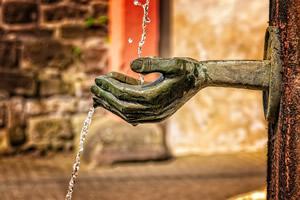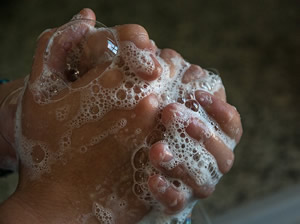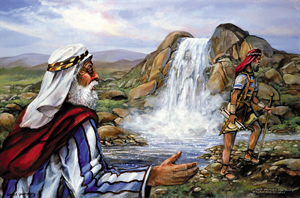Day 65-66, Chronological Bible Study Timeline. Map. Go to today’s Bible reading (use your browser arrow to return): Numbers 19–21; Psalm 90
Note: Since this is a two-day study, you can read the Scripture passage on Day 65 and this Bible study on Day 66.
Water, the Invaluable Resource
Water is an invaluable resource. We use it for drinking, cleaning, transportation, and a host of other things. In the desert, water is crucial for survival. Imagine having to supply enough water in this arid climate to satisfy the thirst of hordes of people and animals.
In the 15th century B.C., the Jewish people (the Israelites) were in a trek across the Sinai desert with over two million people and their flocks and herds of sheep, goat, and bovines. They were desperate for water but had to learn to trust God through the Waters of Cleansing, Waters of Testing, and until they experienced the refreshing Waters of Victory.
Waters of Cleansing
Before their trek across the desert, God established ordinances for cleanliness and purity. We read about this in the book of Leviticus.
In today's Bible reading in the book of Numbers, there's another ordinance for the cleansing of Israel's congregation. In part, what prompts this new regulation results from Israel's refusal to trust God that he would help them fight for their inheritance. They refused to go against the giants in the land. Since the Israelites rebelled against him, all of them would die in the desert, except their children under twenty. The only exceptions were Caleb and Joshua (Numbers 14:29–35, NIV).
Every day, many of God's people would die in the wilderness because of their disobedience. The Israelites would touch the human remains to bury them. Later, as they engage in battle, the blood of wounded and fallen soldiers would also contaminate them. There was, therefore, a necessity for a law or procedure for cleansing—it would prevent the spread of disease and the spiritual contamination of the tabernacle (and later the temple). God wants his people to be healthy, and he wants them to approach him in holiness. They mustn't enter the tabernacle of the LORD being unclean—God would kill them for violating his holiness.
Suppose an Israelite had contact with, or was exposed to, a dead body or an open vessel in the same room as the deceased? In that case, the priests would isolate him from the rest of the congregation. That person would go outside the camp, clean himself and his clothes with ashes from a pristine heifer added to water. And, on the third and seventh days of the week, he would have a ceremonial cleansing, sprinkling him with the soap mixture. He must remain outside the camp for seven days before the priests would declare him clean and he could return.
We have no such ceremonial law or practice today. However, we take special care when coming into contact with anyone deceased to prevent catching contagious diseases.
Spiritually speaking, Jesus purifies us from all uncleanness and guilt when we confess our sins to him. He doesn't cleanse us with soap, but figuratively, he cleanses us with his blood, which was shed on the cross for us (1John 1:7).
Waters of Testing
God put the Israelites through a couple of years of hard tests. Can we relate to that? Why did God do that? Maybe, he put the Israelites through tests so they (like us) would believe in God and rely upon him. They failed. Instead, they tried the LORD's patience beyond any reasonable endurance (Numbers 14:22). Because of their sins, rebellion, and lack of faith, they would have to endure the desert hardships for forty more years. Added to these afflictions would be the daily emotional distress of funerals.
Few changes happen in the Israelite's forty years of wandering in the desert. They still grumble and complain about the camp's food and lack of water. Moses and Aaron are angry—they have to endure Israel's constant complaints. When God tells Moses to speak to “that rock” (evidently a rock that holds back a large spring of water), Moses exhibits his exasperation with the people. He says to them, “Listen, you rebels, must we bring you water out of this rock?” (Numbers 20:10, NIV; emphasis mine). And then, instead of speaking to it, Moses strikes the rock twice with his staff!
Afterward,
Leaders must rule with diligence (Romans 12:8; 2 Peter 1:5), and spiritual leaders, especially, need to do all the will of the LORD in the way he wants it done. Do we give God all the glory, or do we draw attention to ourselves? Every spiritual leader and Christian parent should be careful to give the LORD all the praise, even when tired or fed up with circumstances. God honors those who honor him (1Samuel 2:30).the LORD says to Moses and Aaron, “Because you did not trust in me enough to honor me as holy in the sight of the Israelites, you will not bring this community into the land I give them,” (Numbers 20:10-12, NIV).
What Moses did may seem like a trivial violation of God's instructions. Still, Moses and Aaron are Israel's spiritual leaders. “From everyone who has been given much, they will demand much; and from the one who has been entrusted with much, we will ask much more” (Luke 12:48b, NIV). By striking the rock instead of speaking to it, Moses and Aaron were taking glory for themselves—they needed to give the LORD credit for everything.
After forty years of shepherding sheep and cattle in the desert, the Israelites return to Kadesh. (Numbers 20:1, NIV).
From Kadesh, Israel seeks permission to go through Edom on the King’s Highway. This is the most direct and accessible route from the south of Edom to the north towards Damascus. However, the Edomites (descendants of Esau) absolutely refuse, and they even take up arms to repel the Israelites.For this sin against his brother's descendants (Jacob's descendants are Israelites), God will punish Edom. Discouraged and frustrated by Edom's refusal, the Israelites turn away and follow a desert path around Edom.
Fourth months later, Aaron dies on Mount Hor because of failing The Waters of Testing (Numbers 20:26; 33:38). His son, Eleazar, becomes the new high priest. After thirty days of mourning for Aaron, they continue their desert trek toward Canaan.
Once again, the people complain about the hardships of the desert and the food the LORD supplies (manna and quail). Because of their ungratefulness, The LORD sends snakes to bite them, and many die.
The Israelites immediately recognize they have sinned by complaining against God and opposing Moses, so they beg him to pray for them. In response, the LORD instructs Moses to build a bronze snake, and all who look upon it will live. Jesus said, “Just as Moses lifted up the snake in the desert, so the Son of Man must be lifted up, that everyone who believes in him may have eternal life” (John 3:14-15, NIV). Jesus was lifted up upon a cross of crucifixion. All who look to him in faith for salvation from their sins receive eternal spiritual life (John 3:16, (more...).
Probably toward the end of the forty years of testing, Moses writes Psalm 90. The people in the Psalm are older and want to redeem the time they have left. They still want to lead good lives. To do this, they must recognize their wrongdoings, turn to God from their sins, and bear their trials. As God sees their change of heart, he's compassionate and exercises mercy. This doesn't mean that the testings will be easier from this point forward, but with the Almighty on their side, they'll be able to bear it.
What about us? Are any of us being disciplined? Are we submitting to that discipline with a changed heart? God has mercy on those who humble themselves and repent; they may yet be able to lead useful lives.

Waters of Victory; Refreshing!
After the snake incident, the Israelites live by faith (at least for a little while). There is no mention of murmuring or complaining for the next 100 miles of the Israelites' trek toward the Promised Land. Then, without their murmuring, God leads them to a spring of water in Beer (a town near the border of Moab). The people rejoice with singing! They're refreshed!
Shortly after that, God gives them military victories. Once again, he's working on their behalf! They slay the Amorites and Bashanites and become a threat to all the area's kings. If we learn to trust God instead of murmuring and complaining, the LORD can also refresh our spirits and give us victories.
Perhaps you stumbled onto this website and don't know God. Jesus said, "Whoever is thirsty, let him come; and whoever wishes, let him take the free gift of the water of life," (Revelation 22:17). Learn more
Discussion
What was the purpose of the waters of cleansing? Spiritually speaking, how are we made clean today?
God puts most of us through waters of testing. Why do you suppose that is?
Victory Waters are refreshing! When does that happen?
1. Some have suggested that twenty might be the age of accountability.
2. Ashes and water would form soap
Focus Verse
Deuteronomy 20:4 (NIV) “For the LORD your God is the one who goes with you to fight for you against your enemies to give you victory.”
Write a private prayer response to today’s Bible study:
Please send your comments to me, Rod, the author
Looking Ahead: Now that Israel has been through testing, in our next lesson they learn that God Protects His Own. Join us to find out how he does this for them and how he might do this for you.
Back to top of page
Return to Chronological Bible Studies main page
Go to Scriptures main page
Go to Topics main page
Go to Home pagere-edited 3-11-2023
Copyright @ 2019, Chronological Bible Studies




